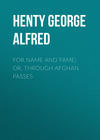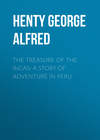Czytaj książkę: «The Lost Heir», strona 11
Neither Miss Purcell nor Netta had spoken from the time they had entered the room, but as soon as they took their places in the carriage waiting for them, they burst out.
"What an extraordinary thing, Hilda! And yet," Miss Purcell added, "the search for Walter may do good in one way; it will prevent you from turning your thoughts constantly to the past and to the loss that you have suffered."
"If it had not been for Walter being missing, aunt, I should have thought nothing of uncle's appointing Mr. Simcoe as heir to his property if anything should happen to him. This man had obtained an extraordinary influence over him, and there can be no doubt from uncle's statement to me that he owed his life solely to him, and that Simcoe indeed was seriously injured in saving him. He knew that I had no occasion for the money, and have already more than is good for a girl to have at her absolute disposal; therefore I am in no way surprised that he should have left him his estate in the event of Walter's death. All that is quite right, and I have nothing to say against it, except that I have always disliked the man. It is only the extraordinary disappearance of Walter, just at this moment, that seems to me to render it certain that Simcoe is at the bottom of it. No one else could have had any motive for stealing Walter, more than any other rich man's child. His interest in his disappearance is immense. I have no doubt uncle had told him what he had done, and the man must have seen that his chance of getting the estate was very small unless the child could be put out of the way."
"You don't think," Netta began, "that any harm can have happened to him?"
"No, I don't think that. Whether this man would have shrunk from it if there were no other way, I need not ask myself; but there could have been no occasion for it. Walter is so young that he will very soon forget the past; he might be handed over to a gypsy and grow up a little vagrant, and as there is no mark on him by which he might be identified, he would be lost to us forever. You see the man can afford to wait. He has doubtless means of his own – how large I do not know, but I have heard my uncle say that he had handsome chambers, and certainly he lived in good style. Now he will have this legacy of ten thousand pounds, and if the court keeps him waiting ten or fifteen years before pronouncing Walter dead, he can afford to wait. Anyhow, I shall have plenty of time in which to act, and it will require a lot of thinking over before I decide what I had best do."
She lost no time, however, in beginning to work. Posters offering the reward of five hundred pounds for information of the missing boy were at once issued, and stuck up not only in London, but in every town and village within thirty miles. Then she obtained from Mr. Pettigrew the name of a firm of trustworthy private detectives and set them to make inquiries, in the first place at all the institutions where a lost child would be likely to be taken if found, or where it might have been left by a tramp. Two days after the reading of the will she received the following letter from John Simcoe:
"Dear Miss Covington: I have learned from Messrs. Farmer & Pettigrew the liberal and I may say extraordinary generosity shown towards myself by the late General Mathieson, whose loss I most deeply deplore. My feelings of gratitude are at the present moment overwhelmed by the very painful position in which I find myself. I had, of course, heard, upon calling at your door to make inquiries, that little Walter was missing, and was deeply grieved at the news, though not at the time dreaming that it could affect me personally. Now, however, the circumstances of the case are completely changed, for, by the provisions of the will, I should benefit pecuniarily by the poor child's death. I will not for a moment permit myself to believe that he is not alive and well, and do not doubt that you will speedily recover him; but, until this occurs, I feel that some sort of suspicion must attach to me, who am the only person having an interest in his disappearance. The thought that this may be so is distressing to me in the extreme. Since I heard of his disappearance I have spent the greater part of my time in traversing the slums of London in hopes of lighting upon him. I shall now undertake wider researches, and shall to-day insert advertisements in all the daily papers, offering one thousand pounds for his recovery. I feel sure that you at least will not for a moment entertain unjust suspicions concerning me, but those who do not know me well may do so, and although at present none of the facts have been made public, I feel as if I were already under a cloud, and that men in the club look askance at me, and unless the child is found my position will speedily become intolerable. My only support in this trial is my consciousness of innocence. You will excuse me for intruding upon your sorrow at the present moment, but I felt compelled to write as I have done, and to assure you that I will use every effort in my power to discover the child, not only for his own sake and yours, but because I feel that until he is discovered I must continue to rest under the terrible, if unspoken, suspicion of being concerned in his disappearance.
"Believe me, yours very truly,"John Simcoe."
CHAPTER XII.
DR. LEEDS SPEAKS
After reading John Simcoe's letter, Hilda threw it down with an exclamation of contempt.
"Read it!" she said to Netta, who was alone with her.
"The letter is good enough as it stands," Netta remarked, as she finished it.
"Good enough, if coming from anyone else," Hilda said scornfully, "perhaps better than most men would write, but I think that a rogue can generally express himself better than an honest man."
"Now you are getting cynical – a new and unpleasant phase in your character, Hilda. I have heard you say that you do not like this man, but you have never given me any particular reason for it, beyond, in one of your letters, saying that it was an instinct. Now do try to give me a more palpable reason than that. At present it seems to be only a case of Dr. Fell. You don't like him because you don't."
"I don't like him because from the first I distrusted him. Personally, I had no reason to complain; on the contrary, he has been extremely civil, and indeed willing to put himself out in any way to do me small services. Then, as I told you, Walter disliked him, too, although he was always bringing chocolates and toys for him; so that the child's dislike must have been also a sort of instinct. He felt, as I did, that the man was not true and honest. He always gave me the impression of acting a part, and I have never been able to understand how a man of his class could have performed so noble and heroic an act as rushing in almost unarmed to save another, who was almost a stranger to him, from the grip of a tiger. So absolutely did I feel this that I have at times even doubted whether he could be the John Simcoe who had performed this gallant action."
"My dear Hilda, you are getting fanciful! Do you think that your uncle was likely to be deceived in such a matter, and that he would not have a vivid remembrance of his preserver, even after twenty years?"
"That depends on how much he saw of him. My uncle told me that Mr. Simcoe brought some good introductions from a friend of his at Calcutta who came out in the same ship with him. No doubt he dined at my uncle's two or three times – he may even have stayed a few days in the house – possibly more; but as commanding the district my uncle must have been fully occupied during the day, and can have seen little of him until, I suppose, a week or so after his arrival, when he invited him to join in the hunt for a tiger. Although much hurt on that occasion, Simcoe was much less injured than my uncle, who lay between life and death for some time, and Simcoe had left before he was well enough to see him. If he had dined with my uncle a few times after this affair, undoubtedly his features would have been so impressed on him that he would have recognized him, even after twenty years; but, as it was, he could have no particular interest in this gentleman, and can have entertained but a hazy recollection of his features. In fact, the General did not recognize him when he first called upon him, until he had related certain details of the affair. It had always been a sore point with my uncle that he had never had an opportunity of thanking his preserver, who had, as he believed, lost his life at sea before he himself was off his sick bed, and when he heard the man's story he was naturally anxious to welcome him with open arms, and to do all in his power for him. I admit that this man must either have been in Benares then, or shortly afterwards, for he remembered various officers who were there and little incidents of cantonment life that could, one would think, be only known to one who had been there at the time."
"But you say he was only there a week, Hilda?"
"Only a week before this tiger business; but it was a month before he was able to travel. No doubt all the officers there would make a good deal of a man who had performed such a deed, and would go and sit with him and chat to while away the hours; so that he would, in that time, pick up a great deal of the gossip of the station."
"Well, then, what is your theory, Hilda? The real man, as you say, no doubt made a great many acquaintances there; this man seems to have been behind the scenes also."
"He unquestionably knew many of the officers, for uncle told me that he recognized several men who had been out there when he met them at the club, and went up and addressed them by name."
"Did they know him also?"
"No; at first none of them had any idea who he was. But that is not surprising, for they had seen him principally when he was greatly pulled down; and believing him to be drowned, it would have been strange indeed if they had recalled his face until he had mentioned who he was."
"Well, it seems to me that you are arguing against yourself, Hilda. Everything you say points to the fact that this man is the John Simcoe he claims to be. If he is not Simcoe, who can he be?"
"Ah! There you ask a question that I cannot answer."
"In fact, Hilda, you have nothing beyond the fact that you do not like the man, and believe that he is not the sort of man to perform an heroic and self-sacrificing action, on behalf of this curious theory of yours."
"That is all at present, but I mean to set myself to work to find out more about him. If I can find out that this man is an impostor we shall recover Walter; if not, I doubt whether we shall ever hear of him again."
Netta lifted her eyebrows.
"Well, at any rate, you have plenty of time before you, Hilda."
The next morning Dr. Leeds, who had not called for the last three or four days, came in to say that he was arranging a partnership with a doctor of considerable eminence, but who was beginning to find the pressure of work too much for him, and wanted the aid of a younger and more active man.
"It is a chance in a thousand," he said. "I owe it largely to the kind manner in which both Sir Henry Havercourt and Dr. Pearson spoke to him as to my ability. You will excuse me," he went on, after Hilda had warmly congratulated him, "for talking of myself before I have asked any questions, but I know that, had you obtained any news of Walter, you would have let me know at once."
"Certainly I should; but I have some news, and really important news, to give you." And she related the production of the new will and gave him the details of its provisions.
He looked very serious.
"It is certainly an ugly outlook," he said. "I have never seen this Simcoe, but I know from the tone in which you have spoken of him, at least two or three times, that he is by no means a favorite of yours. Can you tell me anything about him?"
"Not beyond the fact that he saved the General's life from a tiger a great many years ago. Shortly after that he was supposed to be lost at sea. Certainly the vessel in which he sailed went down in a hurricane with, as was reported, all hands. He says that he was picked up clinging to a spar. Of his life for the twenty years following he has never given a very connected account, at least as far as I know; but some of the stories that I have heard him tell show that he led a very wild sort of life. Sometimes he was working in a small trader among the islands of the Pacific, and I believe he had a share in some of these enterprises. Then he claims to have been in the service of a native prince somewhere up beyond Burmah, and according to his account took quite an active part in many sanguinary wars and adventures of all sorts."
The doctor's face grew more and more serious as she proceeded.
"Do I gather, Miss Covington, that you do not believe that this man is what he claims to be?"
"Frankly that is my opinion, doctor. I own that I have no ground whatever for my disbelief, except that I have naturally studied the man closely. I have watched his lips as he spoke. When he has been talking about these adventures with savages he spoke without effort, and I have no doubt whatever that he did take part in such adventures; but when he was speaking of India, and especially when at some of the bachelor dinners uncle gave there were officers who had known him out there, it was clear to me that he did not speak with the same freedom. He weighed his words, as if afraid of making a mistake. I believe that the man was playing a part. His tone was genial and sometimes a little boisterous, as it might well be on the part of a man who had been years away from civilization; but I always thought from his manner that all this was false. I am convinced that he is a double-faced man. When he spoke I observed that he watched in a furtive sort of way the person to whom he was speaking, to see the effect of his words; but, above all, I formed my opinion upon the fact that I am absolutely convinced that this man could never have performed the splendid action of facing a wounded tiger unarmed for the sake of one who was, in fact, but a casual acquaintance."
"You will excuse me if I make no comment on what you have told me, Miss Covington. It is a matter far too serious for any man to form a hasty opinion upon. I myself have never seen this man, but I am content to take your estimate of his character. One trained, as you were for years, in the habit of closely watching faces cannot but be a far better judge of character than those who have not had such training. I will take two or three days to think the matter over; and now will you tell me what steps you are taking at present to discover Walter?"
She told him of what was being done.
"Can you suggest anything else, Dr. Leeds?"
"Nothing. It seems to me that the key to the mystery is in the hands of this man, and that it is there it must be sought, though at present I can see no way in which the matter can be set about. When one enters into a struggle with a man like this, one must be armed at all points, prepared to meet craft with craft, and above all to have a well-marked-out plan of campaign. Now I will say good-morning. I suppose Miss Purcell and her niece will stay on with you, at any rate for a time?"
"For a long time, I hope," she said.
"May I ask if you have stated the view that you have given me to Miss Netta Purcell?"
"Yes, I have told her. She is disposed to treat it as an absurd fancy on my part, but if I can get anything to go upon which will convince her that there is even a faint possibility of my being right, she will go through fire and water to assist me."
"I can well believe that," the doctor said. "I am sure that she has a strong character, although so lively and full of fun. Of course, having been thrown with her for four months, I am able to form a very fair opinion of her disposition."
After Dr. Leeds had left, Hilda began to build castles for her friend.
"It would be a splendid thing for her," she said. "He is certainly not a man to speak in the way he did unless he thoroughly meant it. I should think that they were just suited to each other; though it would be really a pity that the scheme I had set my mind upon for getting her over here as head of an institution for teaching deaf and dumb children on Professor Menzel's plan should come to nothing. Perhaps, though, he might be willing that she should act as the head of such an establishment, getting trained assistants from those she knows in Hanover and giving a few hours a day herself to the general supervision, if only for the sake of the good that such an institution would do among, perhaps the most unfortunate of all beings. I am quite sure that, so far, she has no thought of such a thing. However, perhaps I am running on too fast, and that he only means what he said, that he admired her character. I suppose there is no reason that because a man admires a girl's character he should fall in love with her, and yet Netta is so bright and cheerful, and at the same time so kind and thoughtful, I can hardly imagine that any man, thrown with her as he has been, could help falling in love with her."
Netta was surprised when Hilda told her that Dr. Leeds had been inclined to view her theory seriously.
"Really, Hilda? Certainly he is not the sort of man to be carried away by your enthusiasm, so please consider all that I have said upon the subject as unspoken, and I will stand neutral until I hear further what he says."
"He did not say very much, I admit, Netta; but he said that he would take the matter seriously into consideration and let me know what he thinks in two or three days."
"I am afraid that he wants to let you down gently," Netta said. "Well, well, don't looked vexed! I will say no more about it until this solemn judgment is delivered."
Netta was in the room when Dr. Leeds called, two days later.
"Netta is in all my counsels, Dr. Leeds," Hilda said, "and she is, as a rule, a capital hand at keeping a secret, though she did let mine slip out to you."
There was no smile on the doctor's face, and both girls felt at once that the interview was to be a serious one.
"I am well aware that I can speak before Miss Purcell," he said, "although there are very few people before whom I would repeat what I am going to say. I have two questions to ask you, Miss Covington. What is the date of this last will of your uncle's?"
"It is dated the 16th of May."
"About a fortnight before the General's alarming seizure?"
Hilda bowed her head in assent. The next question took her quite by surprise.
"Do you know whether this man Simcoe was one of the party when the seizure took place?"
"He was, doctor. My uncle told me that he was going to dine with him, and Dr. Pearson mentioned to me that he was next to the General and caught him as he fell from his chair."
Dr. Leeds got up and walked up and down the room two or three minutes.
"I think that now things have come to the present pass you ought to know what was the opinion that I originally formed of General Mathieson's illness. Dr. Pearson and Sir Henry Havercourt both differed from me and treated my theory as a fanciful one, and without foundation; and of course I yielded to such superior authority, and henceforth kept my ideas to myself. Nevertheless, during the time the General was under my charge I failed altogether to find any theory or explanation for his strange attack and subsequent state, except that which I had first formed. It was a theory that a medical man is always most reluctant to declare unless he is in a position to prove it, or at least to give some very strong reason in its favor, for a mistake would not only cost him his reputation, but might involve him in litigation and ruin his career altogether. But I think that I ought to tell you what my opinion is, Miss Covington. You must not take it for more than it is worth, namely as a theory; but it may possibly set you on a new track and aid you in your endeavor to discover the missing child."
The surprise of the two girls increased as he continued, after a pause:
"Ever since the day when I was first requested to act as the General's resident medical man I have devoted a considerable time to the study of books in which, here and there, could be found accounts of the action of the herbs in use among the Obi women, fetich men, and so-called wizards on the West Coast of Africa, also in India, and among the savage tribes of the Malay Archipelago and the Pacific Islands. What drugs they use has never been discovered, although many efforts have been made to obtain a knowledge of them, both in India and on the West Coast; but doctors have found it necessary to abandon the attempt, several of them having fallen victims of the jealousy of these people because of the researches they were making. But at the least the effects of the administration of these drugs have been frequently described, and in some respects these correspond so closely to those noticeable in the General's case that I say now, as I said at first, I believe the General's illness was caused by the administration of some drug absolutely unknown to European science."
"You think that my uncle was poisoned?" Hilda exclaimed in a tone of horror, while Netta started to her feet with clenched hands and flushed face.
"I have not used the word 'poisoned,' Miss Covington, though in fact it comes to that. It may not have been administered with the intention of killing; it may have been intended only to bring on a fit, which, in due time, might have been attended by others; but the dose may have been stronger than its administrator intended."
"And you think, Dr. Leeds – you think that it was administered by – "
"No, Miss Covington; I accuse no one. I have no shadow of proof against anyone; but taking this illness, with the abduction of the child, it cannot be denied that one's suspicions must, in the first case, fall upon the man who has profited by the crime, if crime it was. On May 16 this will was drawn up, bequeathing the property to a certain person. The circumstances of the will were curious, but from what I learned from you of the explanation given by the lawyers who drew it up, it seems fair and above-board enough. The General was certainly greatly under the influence of this man, who had rendered him the greatest service one man can render another, and that at the risk of his own life. Therefore I do not consider that this will, which was, so to speak, sprung upon you, is in itself an important link in the chain. But when we find that twelve or fourteen days afterwards the General was, when at table, seized with a terrible fit of an extraordinary and mysterious nature, and that the man who had an interest in his death was sitting next to him, the coincidence is at least a strange one. When, however, the General's heir is abducted, when the General is at the point of death, the matter for the first time assumes a position of the most extreme gravity.
"At first, like you, I thought that Walter had either been stolen by some woman for the sake of his clothes, or that he had been carried off by someone aware that he was the General's heir, with a view to obtaining a large sum of money as his ransom. Such things have been done before, and will, no doubt, be done again. The first hypothesis appears to have failed altogether; no woman who had robbed a child of his clothes would desire to detain him for an hour longer than was necessary. The inquiries of the police have failed altogether; the people you have employed have ascertained that neither at the workhouses of London nor in the adjacent counties has any child at all answering to Walter's description been left by a tramp or brought in by the police or by someone who had found him wandering about. It cannot be said that the second hypothesis is also proved to be a mistaken one; the men who took him away would be obliged to exercise the greatest caution when opening negotiations for his release, and it might be a month or more before you heard from them.
"Therefore, it would be unfair to this man Simcoe to assume that he is the author of the plot until so long a period has passed that it is morally certain that the boy was not stolen for the purpose of blackmail. However, we have the following suspicious circumstances: first, that, as I believe, the General was drugged by some poison of whose nature we are ignorant beyond that we read of very similar cases occurring among natives races in Africa and elsewhere. Then we have the point that no one would have had any interest in the General's death, with the exception of the man he had named as his heir in the event of the child's death. We know by the man's statement that he was for many years living among tribes where poisons of this kind are used by the wizards and fetich men to support their authority and to remove persons against whom they have a grudge. Lastly, we have the crowning fact of the abduction of the child, who stood between this man and the estates. All this is at best mere circumstantial evidence. We do not know for certain what caused the General's fit, we have no proof that Simcoe had any hand in the abduction, and whatever our opinion may be, it is absolutely necessary that we do not breathe a hint to anyone."
Hilda did not speak; the shock and the horror of the matter were too much for her. She sat with open lips and blanched face, looking at Dr. Leeds. Netta, however, leaped to her feet again.
"It must be so, Dr. Leeds. It does not seem to me that there can be a shadow of doubt in the matter, and anything that I can do to bring the truth to light I will do, however long a time it takes me."
"Thank you, Netta," Hilda said, holding out her hand to her friend; "as for me, I will devote my life to clearing up this mystery."
"I am afraid, Miss Covington, that my engagements henceforth will prevent my joining actively in your search, but my advice will always be at your service, and it may be that I shall be able to point out methods that have not occurred to you."
"But, oh, Dr. Leeds!" Hilda exclaimed suddenly; "if this villain poisoned my uncle, surely he will not hesitate to put Walter out of his path."
"I have been thinking of that," Dr. Leeds exclaimed, "but I have come to the conclusion that it is very unlikely that he will do so. In the first place, he must have had accomplices. The man who spoke to the nurse and the cabman who drove the child away must both have been employed by him, and I have no doubt whatever that the child has been placed with some persons who are probably altogether ignorant of his identity. Walter was a lovable child, and as soon as he got over his first grief he would no doubt become attached to the people he was with, and although these might be willing to take a child who, they were told, had lost its parents, and was homeless and friendless, without inquiring too closely into the circumstances, it is unlikely in the extreme that they would connive at any acts of violence. It is by no means easy to murder and then to dispose of the body of a child of seven, and I should doubt whether this man would attempt such a thing. He would be perfectly content that the boy would be out of his way, that all traces of him should be lost, and that it would be beyond the range of probability that he could ever be identified, and, lastly, even the most hardened villains do not like putting their necks in a noose. Moreover, if in the last extremity his confederates, believing that he had made away with the child, tried to blackmail him, or some unforeseen circumstance brought home to him the guilt of this abduction, he would be in a position to produce the child, and even to make good terms for himself for doing so. You yourself, whatever your feelings might be as to the man whom you believe to be the murderer of your uncle, would still be willing to pay a considerable sum and allow him to leave the country, on condition of his restoring Walter. Therefore I think that you may make your mind easy on that score, and believe that whatever has happened to him, or wherever he may be, there is no risk of actual harm befalling him."
"Thank you very much, doctor. That is indeed a relief. And now have you thought of any plan upon which we had best set to work?"
"Not at present, beyond the fact that I see that the power you both possess of reading what men say, when, as they believe, out of earshot, ought to be of material advantage to you. As Miss Purcell has promised to associate herself with you in the search, I should say that she would be of more use in this direction than you would. You have told me that he must be perfectly aware of your dislike for him, and would certainly be most careful, were you in his presence, although he might not dream of this power that you possess. But he has never seen your friend, and would not be on his guard with her. I have at present not thought over any plan by which she could watch him – that must be for after consideration – but it seems to me that this offers some chance of obtaining a clew."
"I am ready to do anything, Dr. Leeds," Netta said firmly. "You only have to find out a way, and I will follow out your instructions to the letter. First we must find out whether Hilda's theory about this man, which I scoffed at when she first spoke of it to me, is correct."
"You mean the theory that this man is not John Simcoe at all, but someone who, knowing the facts of the rescue from the tiger, and being also well acquainted with people and things in Benares, has personated him? I will not discuss that now. I have an appointment to meet a colleague for consultation in a difficult case, and have already run the time very close. You shall see me again shortly, when I have had time to think the whole matter over quietly."




















